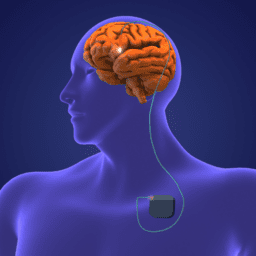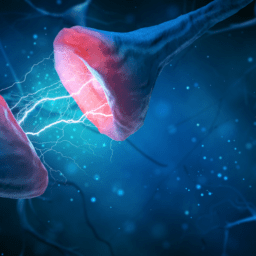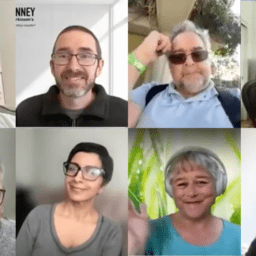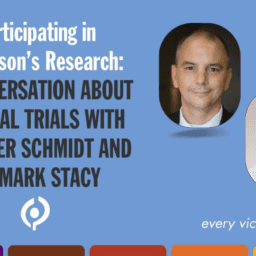In this month’s What’s New in Parkinson’s post, read about Parkinson’s care access in the United States, differences between YOPD in India and western countries, Bayer’s stem cell research success, inclusive beauty tools and products, gaps in understanding of the optimal physical therapy protocol, and more!
PARKINSON’S SCIENCE AND RESEARCH NEWS
- In npj, researchers report on care access and utilization by people with Parkinson’s on medicare in the United States. Key findings include: Only 20% of medicare beneficiaries accessed physical therapy services for Parkinson’s, and 40% of beneficiaries received care only from a primary care provider–not a neurologist or movement disorder specialist.
- Dr. Pramod Kumar Pal, a neurologist in India, reports on research about distinctions related to young onset Parkinson’s in India and elsewhere in the world.
- The Independent highlights findings, reported at the World Parkinson Congress, regarding NLX-112. This novel treatment aims to ease dyskinesia and motor symptoms of Parkinson’s by influencing the serotonergic system.
- Bayer reports on early stage successes in their stem cell trial for Parkinson’s.
- Health informatics researcher Sara Riggare discusses symptom tracking at the World Parkinson Congress. A video of the presentation is available here.
- Researchers used data from the PPMI study to evaluate the effect of coffee consumption on the dopamine transporter (DAT) availability. They found that coffee consumption around the time of a DatScan correlates with decreased DAT availability. The researchers note: “[O]ur study showed that reduced striatal DAT availability was detected in current coffee consumers but not in former coffee consumers compared with never coffee consumers, suggesting that caffeine’s effects on striatal DAT may fade and disappear after quitting coffee consumption.”
- More research involving PPMI data: Although anti-hypertensive drugs have been considered to have potential to modify progression of Parkinson’s, researchers found data over a two year time frame to be inconclusive about the effect of currently available anti-hypertensive drugs on DAT levels.
- Italian researchers report further evidence in animals of positive effects of exercise on Parkinson’s symptoms. They found that intensive exercise limited alpha-synuclein spreading.
- An overview of the current state of research into LRRK2 gene variants and Parkinson’s appears in npj.
- Movement Disorders discusses results of a study examining the combined effect of environmental factors and genetic variants associated with mitochondrial function on age of Parkinson’s onset.
- Conflicting data about the efficacy of zonisamide, an anti-convulsive therapy, on levodopa-induced dyskinesia: Researchers found that, in mice, acute use of zonisamide had no effect on dyskinesias, but that chronic use of zonisamide concurrently with levodopa delayed onset of dyskinesia while increased the duration of dyskinesia.
- A study involving primates published in Nature Nanotechnology demonstrates the efficacy of intravenously injected viral vectors in crossing the blood brain barrier to deliver gene therapy.
- Outsourcing Pharma features an article describing the road ahead in research into buntanetap and prasinezumab: two treatments in late-stage development that target alpha-synuclein.
- Parkinsonism & Related Disorders published an article in late June about the various alpha-synuclein targeting therapies under development.
- Researchers in npj present an article evaluating the value of smell tests for predicting the likely onset of Parkinson’s.
- New England Journal of Medicine features a study that found no benefit to the MIND diet in influencing risk of cognitive decline in people with family history of dementia.
- An article in Science Advances highlights effects of the gene known as parkin in promoting balanced mitochondrial and lysosomal function. A related article discusses these findings.
- Translational Neurodegeneration features an article describing the animal models used in Parkinson’s research.
- A trial of venglustat in people with Parkinson’s who also have GBA1 variants failed to demonstrate benefit greater than a placebo.
- The FDA asks for further information about a new treatment for motor fluctuations that had been submitted for approval. The treatment is a new formulation combining regular release and extended release levodopa.
- npj features a report from a study of ~8300 Korean people living with Parkinson’s that aimed to evaluate the relationship between Parkinson’s and likelihood of future cancer diagnosis. Rates of overall, colorectal, lung, and pancreatic cancer were lower for people with Parkinson’s than rates in individuals that had been matched to serve as control group comparators.
- While not directly related to Parkinson’s, an Australian study found that participation in literacy related activities reduced risk of dementia. Activities involved in this benefit included taking classes, writing letters, journaling, playing chess, and completing crossword puzzles.
PARKINSON’S TREATMENTS and THERAPIES
- A meta-analysis of 46 studies of physical therapy intervention in Parkinson’s finds that despite published guidelines from the American Physical Therapy Association, while many types of physical therapy have been found to be beneficial for people with Parkinson’s, the optimal treatment duration, regimen, and implementation of physical therapy for people with Parkinson’s remains undetermined.
- Brain features an article that presents a general description of the current theories about how and why DBS works. In their introduction, the authors write, “the widespread interest in the application and expansion of this clinical therapy has preceded an overarching understanding of the neurocircuit alterations invoked by deep brain stimulation.”
- Parkinsonism and Related Disorders features a study describing the use of directional steering of DBS signals to mitigate negative effects of DBS on gait.
- A small, 25-person study involving people who have had bilateral subthalamic nucleus DBS found that five years after having DBS surgery, there was no significant, group level difference between preoperative OFF state speech intelligibility and postoperative ON-stimulation, OFF-medication speech intelligibility.
- Amantadine use can contribute to myoclonus, brief jerking contractions of muscles, and negatively impacts speech. Negative effects resolve when amantadine is discontinued.
PARKINSON’S LIVING WELL STORIES
- Teri Bryant, longtime Hollywood makeup artist, is the founder of Guide Beauty. Following her diagnosis with Parkinson’s, Bryant worked on improving tools to help people living with Parkinson’s, Multiple Sclerosis, and other conditions that affect their dexterity engage in self-care via an emphasis on inclusive design of beauty care tools and products.
- In Her Shoes, a resource for women living with YOPD, was released at the World Parkinson Congress. Several members of the Davis Phinney Foundation community were involved in the production of the booklet.
- A story in The Guardian highlights the Movers and Shakers podcast. One of the members of the podcast team says, “Why do we do the podcast? To make people realize that this is not a death sentence. That you can live a life that is more than coping, perhaps for years. It’s not going to be a happy ending, but then it’s not going to be that for anyone. And advances are being made.”
- Neil Russell was one of many people with Parkinson’s who went to great lengths to attend the World Parkinson Congress.
- Kevin Quaid was diagnosed with Parkinson’s at age 50 and is featured in a story that highlights his drive to live well even as he is faced with the onset of signs of dementia.
PARKINSON’S SURVEYS, CLINICAL TRIALS, AND VOLUNTEER OPPORTUNITIES
- The Speech Accessibility Project (SAP) seeks volunteers for a research initiative aiming to make voice recognition technology more useful for people with a range of diverse speech patterns. More information is available here and here. To determine whether you are eligible to participate, visit the SAP registration page.
- A team of Dutch researchers created PregSpark, a registry for women with Parkinson’s who are pregnant or have recently given birth. The goal is to build an online, International Pregnancy and Parkinson’s Registry to prospectively and uniformly collect data on the course and outcome of as many as possible pregnancies in women with Parkinson’s disease. This data will help women with Parkinson’s make more informed decisions about pregnancy and improve the quality of care pregnant women with Parkinson’s receive. The PregSpark site is currently under construction but should be completed soon.
- Researchers in the UK are seeking survey responses about the usefulness of wearable technology to monitor medication effectiveness and adherence to dosing schedules.
- A phase 1b trial is recruiting volunteers for a study of a treatment that aims to influence inflammation.
- Researchers from University College Cork, in Ireland, invite participation in a survey about gait issues and freezing.
- UK researcher and physician Tom Foltynie writes about ways to improve the structure of clinical trials for Parkinson’s.
- Biogen announces they’re discontinuing the LIGHTHOUSE trial. They note that the discontinuation results from evaluating the complexities and duration of the study and that the decision does not result from any safety or efficacy data. The LUMA study will continue, and participants in the LIGHTHOUSE study will be invited to participate.
- Researchers in Norway are investigating the efficacy of ambroxol in people with dementia with Lewy bodies.
- Researchers in the UK, in partnership with the Women’s Parkinson’s Project and MyMovesMatter, invite participation in a survey about the experience of menopause for women with Parkinson’s.
- Another study of ambroxol is launching. The DUPARG study is recruiting participants in Groningen, Netherlands.
- A new trial examining the possible neuroprotective effect of exercise has been listed by the University of Nevada.
- Researchers at Oregon Health and Sciences University are conducting a study to test whether a specific, dynamic exercise intervention can help prevent falls in people with Parkinson’s. This study uses safety equipment, including harnesses, to facilitate a regimen that involves turning while walking.
- University of Rochester Center for Health + Technology is undertaking a survey study to assess the ability of the Parkinson’s Disease-Health Index to measure patient-relevant changes in disease burden over the course of two years. Participants will complete surveys five times over two years and must be over 18, speak English, and have a self-reported or clinical diagnosis of Parkinson’s. More information is available here.
- Researchers at Columbia University’s Irving Medical Center are seeking participants for a study exploring the role of immune response in Parkinson’s. Participation is open to those with and without Parkinson’s and will involve donating blood, a questionnaire, a cognitive test, and a neurological examination. Click here to express interest in participating.
- Johns Hopkins University has announced a trial to evaluate whether levetiracetam can improve symptoms of Parkinson’s psychosis. The trial is not yet recruiting, but the plan is for it to begin by September. The trial design features a crossover assignment, which means every participant will receive an active trial drug for their participation.
- The LUMA trial continues to recruit participants. This trial aims to assess the safety and efficacy of BIIB122 tablets in slowing the progression of early-stage Parkinson’s. This study has sites in the US, China, France, Germany, the Netherlands, Poland, Spain, and the UK.
- The ACTIVATE trial is recruiting participants for a phase 2 trial of BIA 28-6156 in people with GBA mutations. This 78-week trial has site locations in the US, Canada, and Europe.
- In Colorado, a study the Foundation is funding continues to recruit participants. The study explores low-load resistance training with blood flow restriction to help develop exercise interventions for improved quality of life for people with advanced Parkinson’s.
- Washington University School of Medicine is sponsoring a study aiming to enroll participants with idiopathic REM sleep behavior disorder, as well as healthy controls, in preparation for a trial of neuroprotective treatments against synucleinopathies.
- Florida State University is sponsoring a study of speech articulation deficits in Parkinson’s.
- A study in South Carolina aims to identify brain biomarkers to predict the risk of cognitive change following DBS surgery.
- A survey for those in Ireland seeks to understand the influence of Parkinson’s symptoms and other factors on the quality of life of people with Parkinson’s.
- Another survey for those in Ireland seeks to understand how people access information about Parkinson’s.
- A trial sponsored by the University of Aberdeen in Scotland is recruiting participants for a study of the effects of constipation and changes in the microbiota in Parkinson’s.
- US-based company Neuronascent announces plans for a phase II trial of their neuro-restorative agent NNI-362. The agent is disease-agnostic, and a previous phase I trial for Alzheimer’s disease produced positive early-stage findings.
- Sinopia Biosciences announces they have secured funding for a clinical trial to explore the safety and efficacy of their novel agent in treating levodopa-induced dyskinesia.
- Staying Connected through Communication Study: The University of Washington SPEAC Lab invites individuals living with Parkinson’s to answer survey questions about their communication experiences. This is an online survey study that will take about 30-45 minutes. (Paper surveys are also available.) People with Parkinson’s and their family/friends/coworkers will complete SEPARATE surveys, and data are not shared between participants. This study is open to anyone in the US. Each participant will be mailed a $25 check upon survey completion. Learn more and enroll here.
- PreActive PD Study: This study, available for both English and Spanish speakers, implements an occupational-therapist-delivered physical activity behavior change coaching intervention in people with early-stage Parkinson’s. The study is based upon a recent single-arm cohort feasibility study (Pre-Activate PD/HD) that evaluated acceptability, implementation, and resulting effect estimates of the Pre-Activate PD intervention in 13 participants. The intervention provides one-on-one coaching sessions from an occupational therapist to individuals newly diagnosed with Parkinson’s. The individualized structured support in the sessions is aimed at facilitating and optimizing exercise uptake as part of an effective self-management program. Learn more and enroll here.
- Gamma Wave Trial: Sponsored by the Massachusetts Institute of Technology (MIT), this trial investigates the efficacy of a non-invasive method of neuromodulation called Gamma Entrainment Using Sensory Stimulation (GENUS) for managing Parkinson’s motor symptoms. GENUS is administered via light, sound, and tactile stimulation devices and has been tested on cognitively normal individuals and individuals with mild Alzheimer’s; the device was found to be safe for use and effective for entrainment in both populations. Learn more here.
- Deep Brain Stimulation (DBS) and Exercise Study at Barrow Neurological Institute: This study aims to help researchers learn more about how aerobic exercise affects symptoms of Parkinson’s and the quality of life in people who have DBS. They will also look at brain wave activity using the Medtronic Percept DBS device to better understand what changes in the brain might be caused by exercise and how that affects Parkinson’s symptoms. Phoenix-area residents reach out to Markey if interested.
- Colorado Oral Strengthening Device: The University of Colorado Denver is looking for adults with Parkinson’s to participate in a research study exploring how a novel low-technology device can increase tongue strength comparable to standard-of-care exercise using tongue depressors but with the kinematics and simple biofeedback of existing high-cost devices. Research has shown that tongue resistance exercises paired with biofeedback results in improved tongue strength to support chewing, control of food and liquid in the mouth, and propulsion of material for a swallow. Learn more and enroll here.
- PD GENEration: The Parkinson’s Foundation announces a major expansion of its national study to make genetic testing and counseling more available for people with Parkinson’s. The study (NCT04057794) hopes to enroll 15,000 people in all 50 US states, Puerto Rico, and the Dominican Republic. Details are available here. For questions about enrollment, email genetics@parkinson.org. Know someone who speaks Spanish and wants to learn more and maybe participate in the study? Share this link.
- Parkinson’s Progression Markers Initiative: In an expanded study, the Parkinson’s Progression Markers Initiative (PPMI) is currently working to enroll up to 100,000 people with and without Parkinson’s. The study team is especially seeking to enroll people diagnosed with Parkinson’s in the past two years and who are not yet on treatment, as well as people 60 and older who aren’t living with Parkinson’s but have a risk factor for it (such as a close relative with Parkinson’s, a known Parkinson’s-associated mutation, and/or REM sleep behavior disorder). The observational study is also enrolling people with no known connection to Parkinson’s to serve as a control group. Learn more here.
- TOPAZ (Trial of Parkinson’s and Zoledronic Acid): Caroline Tanner, MD, PhD, is recruiting participants for a new remote clinical trial led by a team of Parkinson’s experts at UCSF in partnership with researchers from across the country. The study aims to help people with Parkinson’s or parkinsonism maintain their independence by reducing the risk of hip fractures. The study will test if zoledronate, an FDA-approved medication for osteoporosis, can prevent fractures in people with Parkinson’s–whether or not they have osteoporosis. To learn more, visit the study website at TOPAZstudy.org, email TOPAZ@ucsf.edu, or call (415) 317-5748.
- A PD Avengers research group is undertaking a new project called Sparks of Experience, designed to be more systematic about collecting and considering the experiences and ideas that come from the curious minds of people living with Parkinson’s. “In the past, these sometimes quirky ideas inspired by lived experience have turned into significant new directions for research. It could be said we are trying to capture serendipity,” the team says. To learn more and get involved, see the flyer here.
- Game-Based Exercise Project: Researchers at the University of Auckland are investigating how games can be used as potential rehabilitation systems. This project aims to develop suitable game-based exercise experiences to help people living with Parkinson’s. If you are 45 or older, living with a chronic condition such as Parkinson’s, and/or are experiencing age-related health conditions, you are invited to participate in a survey that will help the researchers to understand the community’s interest in games and gameplay in the context of exercise and rehabilitation. To learn more and take the 15-minute survey, see the flyer here.
- SPARX3 – A Phase 3 Clinical Trial about Exercise and Parkinson’s: This research team is currently seeking volunteers to participate in a clinical trial about the effects of aerobic exercise on people with Parkinson’s. Learn more and see if you qualify here. For more details, contact Katherine Balfany at SPARX3@ucdenver.edu.
- PAIRing Up: If you are a person with Parkinson’s or a care partner to someone with Parkinson’s, you are invited to participate in an online survey to address neuropsychiatric (cognition, depression, anxiety) concerns in Parkinson’s. The survey aims to learn about the needs and priorities for clinical care, education, support, and research related to neuropsychiatric symptoms. To learn more and participate, click here to download the flyer.
- The University of Oulu and collaborators from Aalborg University, Fraunhofer University, the University of Manchester, the University of Glasgow, the University of Lisbon, and the University of Melbourne are conducting a survey for people with Parkinson’s and Parkinson’s care partners about self-care. Complete the survey here to share your self-care strategies and techniques. You can also review ideas submitted by others and add them to your own self-care toolbox.
- Home-Based Exercise and Cognitive Behavior Therapy: University of Alabama in Huntsville
- Speech and Telemedicine Study: The Purdue Motor Speech Lab
- Parkinson’s and Service Dogs: University of Groningen, Netherlands
- Neurology Study Interest Registry: University of Rochester
- Park Test: University of Rochester
For more of what’s new in Parkinson’s news, check out our full series here.
WANT MORE PRACTICAL ARTICLES LIKE THIS?
You can learn much more about living well with Parkinson’s today through our Every Victory Counts® suite of resources. Each manual is packed with up-to-date information about everything Parkinson’s. Click the link below to order your manual(s).

















